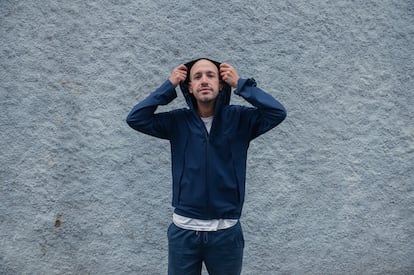Imagine that there comes a time when an algorithm dictates sentences. And that we could have avoided it through a referendum… This is what Simón Casal (A Coruña, 40 years old) proposes in his third film, Artificial justicesomething that has sparked a social debate among jurists who have already seen it in theaters. The Galician filmmaker uses dystopia to warn us of a scenario in which our disputes could be resolved through Artificial Intelligence with a kind of meiga techie (Alba Galocha) who wants to avoid it and a judge (Verónica Echegui) willing to help her.
Ask. We already had justice done like foxes and now you come to put fear in our bodies with Artificial Intelligence in the matter…
R. Yes, anyway, justice is in the spotlight. Artificial Intelligence will enter, the question is how and to what extent. The film tries to warn about that. But it is a debate and a political decision. That is why we propose a referendum in the plot.
P. Given some cases handled by judges, which would be fine, isn’t it simply intelligence?
R. Of course and other types of training or access to the career.
P. Do you think that world is leaning towards elitism?
R. There are profiles in society that do not access the judicial career, I imagine it is a class issue.
Justice should be more transparent and participatory. Achieving it is a political decision.”
P. Not every family can support a child while trying to overcome such tough opposition for years. Do we already find a class problem there?
R. Yes, but, in addition, there is a certain endogamy of families, something traditional that is passed from parents to children.
P. One of the characters in his film wants to open justice to society through technology. The Silicon Valley gurus were also looking for that and look what Christ they have created for not foreseeing that the networks are also loaded by the devil. Where is the dark side?
R. It arises when inventions get out of hand and good intentions go awry. But there are plenty of tasks that AI could solve.
P. Which is it?
R. All those that allow justice to be expedited and unclogged. What cannot happen is for technology to make decisions that must be controlled by people, such as sentences, clearly. The purely administrative or management part may fall there, but not in those areas where the variety of possible results requires knowledge, experience and human sensitivity.
P. Will justice become democratized in a broader sense?
R. It should be more transparent and participatory. Getting to that is a political decision, I insist. The instance system contemplates this, but it should be opened even more. In recent times there have been advances that have to do with new sensitivities. The issue of banking and preferential clauses influenced when it came to reducing the power of the banks. The feminist struggle and the fact that there are more women in the judiciary has changed sensitivity towards these issues due to a purely social fact.
P. After having filmed a documentary and a feature-length fiction film on the same topic, do you want to become a legal filmmaker?
R. No! I am interested in political fiction, utopias and dystopias as creative scenarios.
P. Is what is now in the middle between utopia and dystopia reality?
R. Maybe the present… We live in serious situations. I like to imagine future scenarios for which we need to make decisions now to avoid them and think about what kind of society we want.
We must give value to the weapons we have… Democracy, for example”
P. Are dystopias that genre that has brought the time of science fiction (that which seemed unattainable to us) just around the corner?
R. Yes it’s true.
P. Well, it produces tremendous anxiety!
R. I think that this exercise must be done by cinema, literature and journalism. Dystopias prepare us not to see ourselves deprived of sovereignty.
P. Did the intention of technologists with a good cause at the end of the 20th century change in the 21st when they realized that they were a de facto power and got rich?
R. Yes, and today we are helpless. If each of these technologies increasingly enter our lives with a way of understanding the world based only on one language, English, what will happen to those of us who speak other languages, for example? We must give value to the weapons we have… Democracy, for example, a very valuable weapon to defend ourselves from all that.
P. You are so Galician that in this film you have come up with a technological genius capable of making a spell with which to settle justice.
R. Well yes, it’s true. It was not intentional, but it is a correct interpretation. I was trying to relate the paganism that existed in Galicia millennia ago and AI. All those beliefs and deities that inhabited nature until Christianity arrived and redefined it. But I didn’t find anything that worked for me. In the end…

